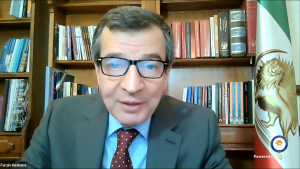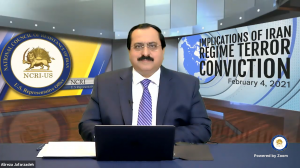Distinguished Policy Veterans Examine Implications of Iran Diplomat’s Terrorism Conviction, Urge a Firm Iran Policy
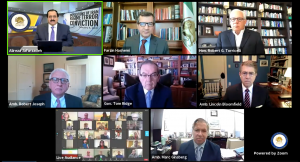
NCRI-US holds a virtual briefing featuring distinguished policy figures to address the implications of the Belgian court’s conviction of Iran diplomat for terrorism, present evidence of Iranian Foreign Ministry’s role in 2018 Paris bombing plot.

Hon. Tom Ridge, former Secretary of Homeland Security, discusses the implications of Belgian court’s conviction of Iran regime’s diplomat for masterminding a foiled bomb attack on the Iranian Resistance's 2018 summit, during the NCRI-US briefing on Feb 4, 2021.
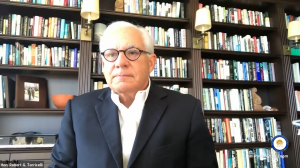
Hon. Robert Torricelli, former Democratic Senator from New Jersey, discusses the implications of the Belgian court’s conviction of Iran diplomat for plotting a foiled bomb attack on the Iranian Resistance's 2018 summit, during the NCRI-US briefing on Feb 4, 2021.

Amb. Robert Joseph, frmr Undersecretary of State for Arms Control & Int'l Security; discusses the implications of the Belgian court’s conviction of Iran diplomat for plotting a foiled bomb attack on the Iranian Resistance's 2018 summit, NCRI-US briefing on Feb 4, 2021.
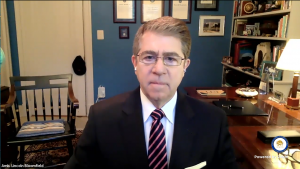
Amb. Lincoln Bloomfield, Jr., Distinguished Fellow & Chairman Emeritus at the Stimson Center, discusses the implications of the Belgian court’s conviction of Iran diplomat for plotting a foiled bomb attack on the Resistance's 2018 summit, NCRI-US briefing, Feb 4, 2021.
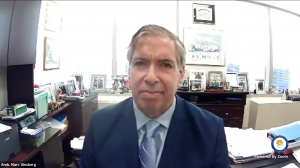
Amb. Marc Ginsberg, former U.S. envoy to Morocco, discusses the implications of the Belgian court’s conviction of Iran diplomat for plotting a foiled bomb attack on the Iranian Resistance's 2018 summit, during the NCRI-US briefing on Feb 4, 2021.
NCRI-US briefing showcases evidence of Iranian Foreign Ministry’s role in 2018 Paris bomb plot targeting Resistance leader Maryam Rajavi
WASHINGTON, DC, UNITED STATES, February 7, 2021 /EINPresswire.com/ -- On Thursday, February 4, 2021, the U.S. Representative Office of the National Council of Resistance of Iran (NCRI-US) hosted a virtual briefing to address the policy implications of the verdict by a Belgian court, sentencing Iranian diplomat-terrorist Assadollah Assadi to 20 years for plotting to bomb a 2018 opposition rally in Paris.
The experts speaking in the NCRI briefing reviewed the extensive evidence, gathered in a two-and-a-half-year multi-national official investigation, confirming the direct role of Iran’s Ministry of Foreign Affairs and its embassy in Austria, in collaboration with the Ministry of Intelligence and Security, in planning, providing the explosives, and executing the terror plot. They discussed the policy implications of the first ever trial and conviction of a diplomat for committing an act of terrorism, although the thwarted bombing was not by far the first incidence of Iranian diplomatic resources being used for terrorism. Since 1984, the United States has classified Iran’s regime as the world’s leading state-sponsor of terrorism. All of Tehran’s major terrorist operations in western nations have been facilitated by its diplomatic corps.
The discussion was opened by NCRI Foreign Affairs member Farzin Hashemi, live from Antwerp, who pronounced the court’s judgement “historic,” describing the intense pressure, and even threats of terrorist retaliation Tehran had applied to relevant governments across Europe to prevent the trial and consequent exposure of irrefutable evidence that “ the entirety of the regime was involved. Based on our own information, the decision had been made at the Supreme Security Council headed by Hassan Rouhani and approved by Khamenei, and then it was assigned to the Minister of Intelligence in close cooperation with the Minister of Foreign Affairs to conduct the operation.”
Mr. Hashemi cited numerous statements by the presiding judge, confirming that “it was state terrorism” and that the terrorists “used diplomatic privilege as a facilitator for their operation.” He also underscored that at issue was not “terrorism that occurred in the past, but an operation which is still ongoing because that terrorist network, that terrorist apparatus, is still there, is still operating.” Mr. Hashemi concluded by calling on “European governments, as well as the United States, to take the appropriate position, take the appropriate measures, in order to confront the regime's malign behavior, whether in the field of terrorism or the human rights violations in Iran. “
The Honorable Tom Ridge, former Secretary of Homeland Security and Governor of Pennsylvania, reiterated the panel’s commendation of “the people of Belgium, their judicial system, their security service, for their courage, for their thoroughness in this investigation… it was a state-sponsored terrorist act. And that reprehensible act isn't the first, but there's a series of acts over the past 30 or 40 years… We know that this is just the most recent terrorist event. But they've exported terrorism throughout Europe on multiple occasions. We know they've spent hundreds of millions of dollars, perhaps in excess of billions of dollars in the Middle East supporting Hamas and Hezbollah in order to keep that cauldron boiling with the anxiety and unrest. We know they have supported proxies in Bahrain, in Yemen, in Syria, in Lebanon, in Iraq. We know that internally they have killed 30 or 40 thousand men and women who disagreed with the policy, the internal polices, the repressive policies of the Iranian government. We know they have imprisoned and tortured literally thousands and thousands of more individuals.”
Secretary Ridge emphasized that “the most powerful and meaningful” way European nations and the U.S. can repudiate the terrorism of the Tehran regime is to “align themselves … with the hopes and aspirations of the Iranian people… simply recognize the NCRI as the embodiment of the hopes and aspirations of the Iranian people for freedom.”
Senator Robert G. Torricelli, former Democratic Senator from New Jersey, noted that like the other panelists, he was a participant in “that rally that day in June of 2018. But so was the former Prime Minister of Canada, cabinet ministers of Britain, Germany, France, Italy, United States. The former foreign minister of France. Members of Parliament from almost every member of the European community and the United States Congress. Members of the Joint Chiefs of Staff and high military officers of the United States Army. What if the bomb had exploded? the target may have been to assassinate Mrs. Rajavi, to murder her. But almost certainly many of the people I've just identified would have been killed as well.”
In light of the egregious carnage that would certainly have occurred, and the Belgian court’s conclusion that the attack had been conducted by the ruling regime in Tehran, “to maintain diplomatic relationships, to allow the Ministry of Foreign Affairs, in fact to allow [Foreign Minister Javad] Zarif himself to enter Europe, to engage in negotiations, in the face of what might have been is to ignore reality, Mr. Torricelli warned. “A lot of people have a lot of decisions to make after today's verdict. … if the intention of the Biden administration is to reengage with Iran on the nuclear accords, there's some serious thinking to do here. Who's going to be at that table? Zarif? His agents? … The very people who made the decisions to send this weapon to Europe to kill us?”
Former Undersecretary of State for Arms Control and International Security, Ambassador Robert Joseph, also noted that “This act of state terrorism should have a sobering effect. It should end any move to resurrect the appeasement policies of the past and dispel any false nostalgia about working with Foreign Minister Zarif as a moderate influence within the regime…
"It’s now time for the government to act decisively, knowing that further concessions to the regime will only bring more injustice to the Iranian people and more criminal and terrorist acts. For the EU, this should mean the adoption of a firm policy, including the designation of the MOIS and IRGC as terrorist entities, as Mrs. Rajavi has stated, withdrawing the legal status of all of the regime’s agents in Europe, and dramatically reducing the level of diplomatic relations until the regime has demonstrated its commitment to forgo terrorist activities.”
Ambassador Lincoln P. Bloomfield, Jr., former Assistant Secretary of State for Political-Military Affairs, began by emphasizing that “At some point, the United States has to realize that it has tried very hard to make gesture after gesture to Iran… for 41 years, this regime has always acted in bad faith. They’re still attacking us through proxies around the world. They’re undermining UN mediation efforts in Yemen and Syria. They’re funding terror against Israel. And now, once again, they’re aiming the nuclear gun at the rest of the world.”
What can the US do? Asked, Ambassador Bloomfield. "I have three suggestions. Number one, we can, and we should launch a comprehensive counterintelligence investigation in the United States aimed at Iranian agents of influence. If you were following the news in January, an academic Iranian exile was arrested in Boston. He’s published op-eds in the New York Times, but for 14 years he’s been on the payroll of the Iran regime, undeclared. Do you really think he’s the only one in the United States? We need to do that, and I’ve been calling for that for years."
Mr. Bloomfield's second suggestion was for the US, Europe, Canada, and others "to join together to conduct a comprehensive human rights investigation of major crimes tied to leading regime figures. The 1988 massacre of 30,000 political prisoners—we now have evidence, we have proof, we have witnesses, all of this is now available, and the UN is starting to take note. We should press for justice on this." He mentioned the Argentina bombings in the 1990s, the bombings of the US embassy and the embassy annex and the US Marine barracks in the early 1980s, and asked, "Does anyone think that the Iran regime has less blood on its hands than the leaders of the former Yugoslavia who sit in jail at the Hague, convicted by the International Court of Justice? We’ve got to start working now collectively with other like-minded nations, starting in Europe, to prepare those dossiers. This has no connection to nuclear talks."
"And third, we need, as my fellow panelists have said, a comprehensive strategy to end 41 years of terrorism," he said. "Foreign Minister Zarif is completely discredited and there has to be consequences. We need a new strategy. We need a broad new conversation on Iran."
Ambassador Marc Ginsberg, former Ambassador to Morocco and former White House Middle East advisor for President Carter, reviewed the many attempts by consecutive administrations, Democrat and Republican, to encourage “moderates” within the regime, including the Nuclear Deal. To no avail. “The JCPOA provided more time to the Iranian regime to be able to find ways to violate sanctions, to gain more currency—I'm talking about hard currency and diplomatic currency—to engage in more terrorism, to increase its ability to harm our allies abroad, to plot more terrorist attacks in the United States, as well as to in effect begin and continue to plan its own Iran nuclear weapons program under the very eyes of inspectors… Iran has once again proven that it is not going to be in any way, shape or form undermined in its mission to promote and export terrorism and to continue its nuclear weapons program.”
Addressing the Biden administration, Ambassador Ginsberg said "this decision by the Belgian court should be a watershed moment here in the United States, particularly at this time," and called for relevant officials “to hear from all voices” proposing how to best approach Iran. “We have a responsibility to take all of these recommendations and most importantly to ensure that Congress, as well as our allies, as well as those within the Biden administration that are very skeptical about reentry to a JCPOA on our prior terms, to ensure that they have all the ammunition and all the evidence they need.”
The panel discussion concluded with remarks by Alireza Jafarzadeh, deputy director of the NCRI-US, who summed up the position of the Iranian resistance as stated by Mrs. Maryam Rajavi1.
1. This is a historic ruling against the entirety of the regime and its state-sponsored terrorism.
2. All the regime’s embassies in Europe need to be shut down.
3. It is time to hold Foreign Minister Javad Zarif to account; the Foreign Ministry he heads has been consistently involved in terrorism.
4. The regime’s leaders also need to be held to account, and to face justice.
5. Agents of the Iranian regime in western nations must be identified, prosecuted, and expelled. They should not be granted either refugee privileges or citizenship.
6. Any negotiations with the Iranian regime and the return to normal diplomatic status must be conditional on dismantling the mullahs’ terrorist network and ending the human rights violations in Iran.
# # #
--------------------------------------
These materials are being distributed by the National Council of Resistance of Iran-U.S. Representative Office. Additional information is on file with the Department of Justice, Washington, D.C.
NCRI-US
National Council of Resistance of Iran - US Rep. Office
+1 202-747-7847
email us here
WATCH NOW: NCRI-US Briefing: Policy Veterans Urge a Firm Policy following Iran Diplomat’s Terrorism Conviction at http://www.youtube.com/watch?v=NAv8VWzth48

1 https://www.maryam-rajavi.com/en/

